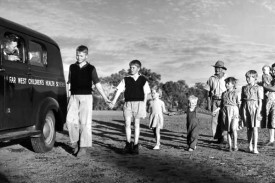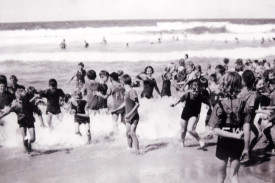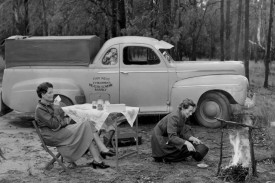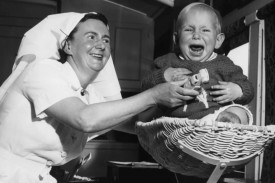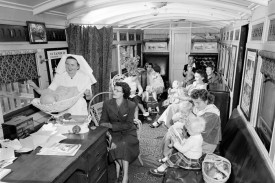General News
19 May, 2025
Nyngan to support Royal Far West’s centenary bike ride
Sitting on Manly Beach recuperating from surgery Cobar-based Reverend Stanley Drummond thought of kids he knew out west who could really benefit from a beach holiday.
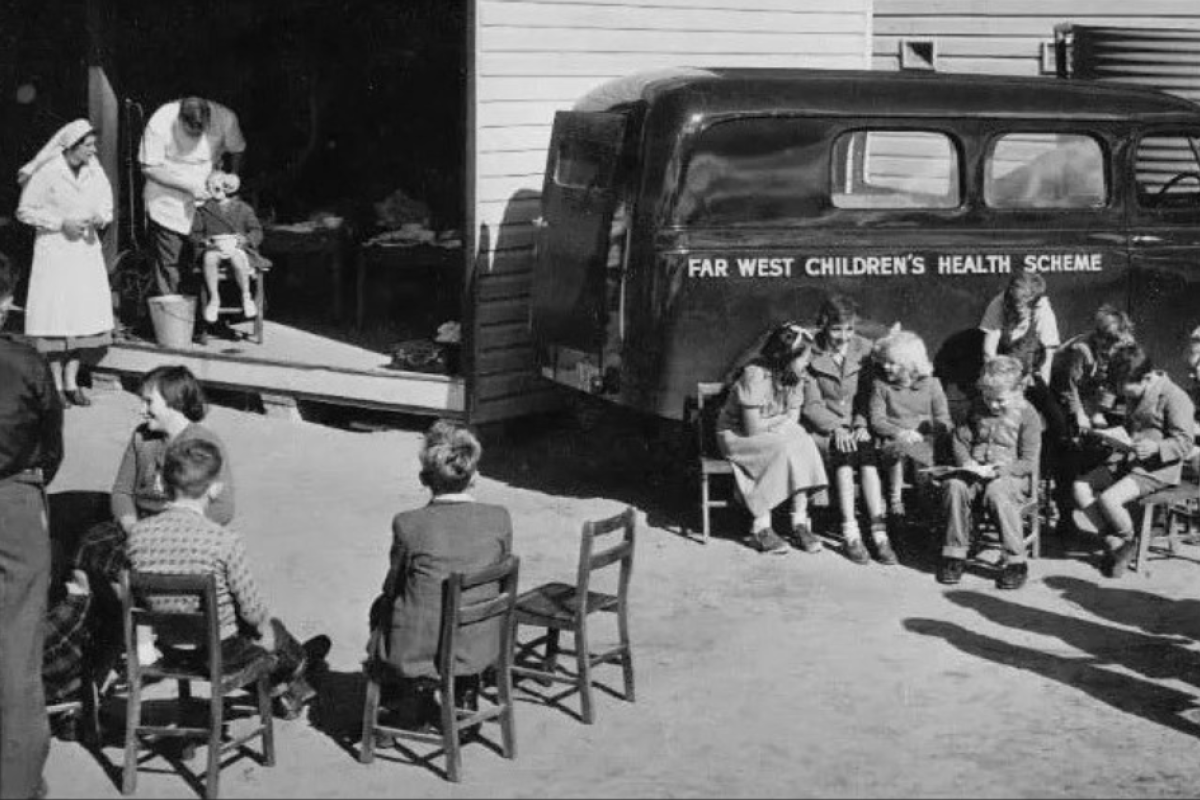
By Jeni Milligan
He acted on that thought, and, one hundred years ago, in January 1925 he and his wife Lucy took 58 children and 6 mothers on the train to the first Far West Seaside Camp. In a couple of years they were taking well over 100 kids annually to camp in makeshift dormitories at the Manly Public School.
For more than 50 years up to the last camp in 1977, country kids were nominated by doctors, teachers, nurses, clergymen etc to join the camps.
Many came from remote places where it was hard to access good medical care. Noticing how many needed medical care, local Manly doctor, George Barron treated the holidaying kids for free.
Working with Dr Barron, Rev. Drummond learned that many children needed not so much a seaside holiday as medical, surgical and dental attention, and the emphasis shifted from holidays to health care and became the Far West Children’s Health Scheme.
In 1928, Mrs Elsie Hill converted her guest house into a home for Far West kids coming to Manly for medical treatment. She became the first matron.
As some kids stayed for months and even years, the department of education provided a teacher to keep up their education.
The need to take preventative care out west to mothers and children was recognised, and in 1931 the first Rail Clinic Car was established on the Bourke, Cobar and Brewarrina Lines -serving Nyngan as well.
In 1932, Cobar’s Sid Coleman saw the benefit of the mobile clinics. He generously provided a plane to reach more remote places with the first Aerial Baby Clinics.
In 1933 a travelling dental clinic vehicle began its rounds out west.
Fundraising to expand the facilities at Manly continued for several years and with the addition of public funds the Drummond Far West Home was opened in 1935. In the same year Nancy Bird Walton, “The Angel of the Outback” and her Gypsy Moth Aeroplane were employed to fly clinic sisters out to remote places.
Community groups along the rail line, like the various CWA branches, were initially the main supporters of the Far West children’s scheme -making donations of money and sending many boxes of groceries to support the camps. Later over 100 community branches of the Far West were established, with some continuing to this day, including a small branch in Nyngan.
Railways and workers band behind Far West
Railway workers were great supporters, and the Far West general secretary commented that “The, staff of the Railway service give much consideration and help to patients, transport attendants and our Baby Health Sisters.” He acknowledged a 100 donation from Narrabri Railway Staff who had donated the profits of their ball.
For decades, Leeton supporters sent boxes and boxes of oranges for camps and for sick kids staying in Manly.
Travelling performers hit the road for the cause. In 1931 they raised £27 in Nyngan and £18 in Hermidale.
Such Far West Concerts were popular events up to the forties.
Many a Nyngan family billeted out-of town locals and kids from Cobar overnighting in Nyngan while waiting for kids from Bourke to arrive before they all rode the mail train to Sydney.
The Nyngan stop-over often coincided with Christmas Day, so the billeting families’ roasts and puddings had to be stretched.
Mrs Will McLaughlin of Whitewood was known for her hospitality to the kids, often taking them out to her place.
In a heatwave she organised a Christmas Picnic Tea at the river for the far-westers. (Some joked about this as a cunning way to make sure they all had a wash!)
Department of Education opens up The Far West School
The number of children staying for very extended periods of treatment in Manly grew steadily, and in 1938 the Department of Education opened The Far West School.
Reverend Drummond sta-yed involved through retirement and illness and the loss of his wife, and six months before he died of cancer in 1943, he visited Far west branches in Nyngan and Coonamble for annual meetings and inspected a new baby health clinic building in Cobar.
He would have been saddened by the ravages of the polio epidemic that broke out in 1945, but heartened by the way the Far West Children’s health scheme met the challenges it brought.
When Polio hit, many children spent very long periods in treatment at Manly.
So many children were affected by polio, that the Far West Home had to develop an in-house splint and surgical boot-making department to provide calipers, crutches, splints and boots. To help parents whose farm and family duties prevented them from visiting their children, Matron Hill toured the west with a film lecture tour dubbed “Taking the Far West to the far west”.
The film was “...a means of showing folk the kind of home their children go to and the kind of treatment they receive at the hands of expert physiotherapists, splint makers and nursing staff at the Drummond Home.”
The film told the story of a little girl from Nyngan sent to Manly to be treated for Polio.
In the early 1950s, the Far West organisation encouraged Nyngan CWA to consider opening a Baby Health Clinic in town, but local numbers were not high enough to achieve the necessary government support so the Clinics on the train continued for a few more years.
In 1959 expansion of the facilities in Manly continued: two more blocks of land were acquired and a new hospital school was opened.
In 1965 Mobile Car Clinics made use of expanding road networks.
In 1970, following a visit to the Far West services in Manly by Queen Elizabeth II, the organisation became “The Royal Far West”.
The work continues as The Royal Far West
The Royal Far West has continued to develop, and since 2011, it has expanded to include more extension work, with an increasing focus on the support of children with complex communication, behavioural and mental health needs in regional and remote areas.
Kids from the Bogan Shire continue to be recipients of this help.
In 2013 Telecare was launched to enable even more country kids to be reached at home with speech therapy and occupational therapies.
In 2017 the Royal Far West launched “The Invisible Children Report” to review children’s health in rural and remote Australia and advocate for greater access to health services. Significant government funding followed and in 2018 the Centre for Country Kids was opened.
This is a purpose build centre providing an integrated health, education and disability service for country kids.
Most importantly, the Centre is supporting the growth of the Telecare for Kids Program.
In the last decade, the number of children and families RFW has supported has increased significantly, with a 69 per cent increase in 2023 alone. Children in regional and remote Australia are waiting up to six years to see a paediatrician, or there are no services at all. Compounding natural disasters, such as bushfires and floods, has seen the number of country kids in need of developmental and mental health services drastically increase.
Nyngan continues to support the organisation
The work goes on and Nyngan locals continue to support the organisation.
For several years the work of the Royal Far West has been significantly supported by a fundraising Bike Ride.
This Centenary Year, 100 Riders are busy contacting sponsors ready for the ride from Bourke, to Cobar, to Nyngan and then to Narromine.
On May 14, they will begin their ride in Bourke, and the riders and their support crew will stop in Nyngan for lunch. They have asked the CWA to provide lunch for a gathering of 160 plus in Davidson Park, so the local branch is reaching out for help to show them some Nyngan hospitality.
The riders will overnight in Bourke on May 14 , in Cobar on May 15, and expect that their leading group will ride into the Big Bogan at 3.30pm on Friday, May 16. Some local Nyngan riders may step up and ride out to meet the peloton and escort them in for the last few kilometres.
Students from Nyngan will join other locals to cheer the riders in and express gratitude for their efforts on behalf of kids in the west.
Local accommodation will be bulging at the seams until they leave early on May 17 to head to Narromine and the end of the ride.
Read More: Nyngan
